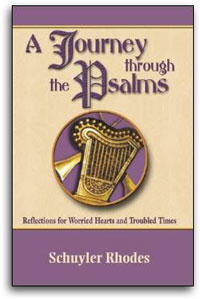Psalm 107:1-3, 17-22
Preaching
A Journey Through the Psalms: Reflections for Worried Hearts and Troubled Times
Preaching the Psalms Cycles A, B, C
It's been said that people have short memories. It must be so. Simple observation is verification enough. Many can site the passage of time as reason enough. Middle age slips barely noticed into old age. Memories blend and soon come the moments when the reason for walking into a room are unclear. Collectively, we forget the lessons of history, as war after war scars the face of God. Acts of tyrants and lunatics conveniently slip the common mind as the tape loop of history plays again and again. Same story, different characters.
These slippages are troubling, it's true, but there is a deeper, more profound memory loss that plagues us. We forget, as this writer points out, our God who has done great things for us.
For the people of Israel, it was forgetting the great liberation of the exodus. "The wondrous works in the land of Ham, and awesome deeds by the Red Sea" (vv. 21-22). This is significant. It's rather like forgetting the name of your mother or father.
Before we get too judgmental with the people of Israel, though, we ought to take a look at ourselves. Confession, it turns out, really is good for the soul. The question to be posed here is not if we have forgotten God, but how. A look at our behavior, particularly within churches, indicates painfully our ecclesial loss of memory.
Are our sanctuaries truly what they claim to be? Safe places? Sanctuaries in deed and not just in name? Have we "broken down the dividing wall, that is, the hostility between us"? (Ephesians 2:14). Or do we make distinctions and judgments, pushing the very people from us whom God calls us to welcome and to love? Have we forgotten the God who calls us into "ministries of reconciliation"? (2 Corinthians 5:16). Do we recall the Savior who gave it all so that we might claim a new life of hope and justice?
These are not trivial questions. Think about our churches. Consider your own church. Is the Christian community a place where God is recalled and honored, both in individual and communal lives, or is God neatly tucked into the shadows of institutional necessities?
Just as people with no vision will surely perish, so too will the faith community that does not keep the saving God at the core of their being. Church budgets, council meetings, and the chatter of the institution may feel important, but it can all become an easy occasion for idolatry (vv. 19-20).
It falls to each of us, then, to remember God, not as an act of sentimental recollection, but as the Savior who comes always into our lives to call us to faithfulness. The creating one who is worthy of our worship, our praise, and yes, our obedience.
These slippages are troubling, it's true, but there is a deeper, more profound memory loss that plagues us. We forget, as this writer points out, our God who has done great things for us.
For the people of Israel, it was forgetting the great liberation of the exodus. "The wondrous works in the land of Ham, and awesome deeds by the Red Sea" (vv. 21-22). This is significant. It's rather like forgetting the name of your mother or father.
Before we get too judgmental with the people of Israel, though, we ought to take a look at ourselves. Confession, it turns out, really is good for the soul. The question to be posed here is not if we have forgotten God, but how. A look at our behavior, particularly within churches, indicates painfully our ecclesial loss of memory.
Are our sanctuaries truly what they claim to be? Safe places? Sanctuaries in deed and not just in name? Have we "broken down the dividing wall, that is, the hostility between us"? (Ephesians 2:14). Or do we make distinctions and judgments, pushing the very people from us whom God calls us to welcome and to love? Have we forgotten the God who calls us into "ministries of reconciliation"? (2 Corinthians 5:16). Do we recall the Savior who gave it all so that we might claim a new life of hope and justice?
These are not trivial questions. Think about our churches. Consider your own church. Is the Christian community a place where God is recalled and honored, both in individual and communal lives, or is God neatly tucked into the shadows of institutional necessities?
Just as people with no vision will surely perish, so too will the faith community that does not keep the saving God at the core of their being. Church budgets, council meetings, and the chatter of the institution may feel important, but it can all become an easy occasion for idolatry (vv. 19-20).
It falls to each of us, then, to remember God, not as an act of sentimental recollection, but as the Savior who comes always into our lives to call us to faithfulness. The creating one who is worthy of our worship, our praise, and yes, our obedience.


